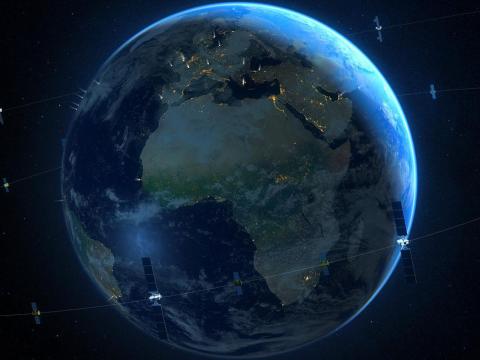U.S Space Force Launches 2021 Hyperspace Challenge
The U.S. Space Force selected 13 startup companies and 11 universities to be a part of the Hyperspace Challenge, an annual event hosted by the service, the Air Force Research Laboratory and CNM Ingenuity. The fourth such challenge will help accelerate solutions and research to support the Space Vehicles Directorate. The space-related organizations specialize in in-space manufacturing, servicing, sensing, propulsion and situational awareness, among other capabilities.
Over the next two months, the organizations will participate in onboarding activities, educational workshops and discussions with military and government customers. The effort will culminate on December 2, with government officials, venture capitalists and satellite experts on hand for the showcase of the participants’ solutions and the announcement of the winners of the challenge.
Because the challenge effort is designed to accelerate U.S. Space Force innovation, the services have made sure that the military sponsors who identified needed solution areas for the challenge have clear pathways for purchasing or contracting of participants’ capabilities. “Part of the role we serve is to help [entities] understand and maneuver the contracting process through the Hyperspace Challenge,” a spokesperson for the challenge said.
As identified by military stakeholders, the topic areas for the effort include:
- Rapid Initial Orbit Determination – solutions that precisely track the trajectory of orbiting space debris through the use of advanced statistical methods;
- Smart Sensing and Machine Learning for Ground Based Remote Sensing of Space Objects – applying machine learning to improve understanding of objects in space and real-time awareness;
- Leveraging Microgravity for Military and Commercial Applications and Products – using the microgravity environment in near-earth orbit to develop both commercial and military applications and products;
- Rocket Cargo Technology for Agile Global Logistics – aiding and improving rocket delivery globally of emergency supplies, including the advancement of rapid-delivery logistics packaging and processes;
- Quantum Sensing for Location and Electro-Magnetic Field Detection – using quantum sensing to detect “the undetectable” in space;
- On-Orbit Servicing, Assembly and Manufacturing – leveraging the use of autonomous robotic spacecraft to provide cost effective inspection, repair, upgrade, refueling, and decommissioning of spacecraft, in space.
The startup companies participating in this year’s Hyperspace challenge include:
- Astroport Space Technologies, located in San Antonio, specializes in space construction and materials manufacturing. Their solutions convert planetary resources into autonomous 3D printing feedstock for in-space construction of lunar surface infrastructure and orbital structures.
- Atomionics, headquartered in Singapore, is building atom-interferometry based sensing systems for navigation and exploration underwater, underground and in other GPS-denied areas.
- G-SPACE is an industrial artificial intelligence company based in Sunnyvale, California. It has a software-as-a-service platform, called ATOM, for creating gravity-independent materials and optimizing in-space manufacturing processes.
- Knight Aerospace supplies custom medical modules for patients and palletized systems for cargo aircraft, such as the C-17 and C-130, that easily roll off and on planes. The company is located in San Antonio.
- Lunar Outpost, headquartered in Golden, Colorado, prepares advanced technology for application on Earth and in space.
- Neutron Star Systems, in Cologne, Germany, is developing superconductor-based electric propulsion systems to provide greater efficiency, scalability and operational flexibility for advanced space missions.
- Analytics Inc., located in Morgantown, West Virginia, prepares analytical solutions to support government and commercial space innovation.
- Obruta Space Solutions, headquartered in Ottawa, Canada, aims to provide “roadside assistance” in space, delivering on-orbit refueling, maneuverability and hardware upgrade services to increase the lifespan of satellites by decades.
- Quaternion Consulting, located in Herndon, Virginia, supplies specialized modeling and simulation solutions, including systems that model the physical dependencies of satellite orbital configurations as well as system performance forecasts.
- SCOUT, headquartered in Alexandria, Virginia, focuses on scalable in-space situational awareness to improve space operations.
- TurnRock specializes in improving the interaction between robot fleets and humans. The company is located in Seattle.
- Varda Space Industries, located in Torrence, California, is specializing in producing materials in space for use back on Earth.
- VEGAMX, located in New York, is creating solutions to address infrastructure, food, energy and national security needs through the combination of air and space borne platforms, using optical, radar and other sensors, and weather and ground data sets.
Universities selected:
- Embry-Riddle Aeronautical University
- New Mexico Technology University’s Norris High Resolution Research Group
- State University of New York at Albany and SFluor Inc.
- Stevens Institute of Technology
- State University of New York Polytechnic Institute
- Texas State University
- University of Texas at El Paso, Aerospace Center
- The Pennsylvania State University, Applied Research Laboratory, Electro-Optics Division
- University of Cincinnati
- University of Colorado, Colorado Springs, College of Engineering and Applied Science
- Utah State University



Comments